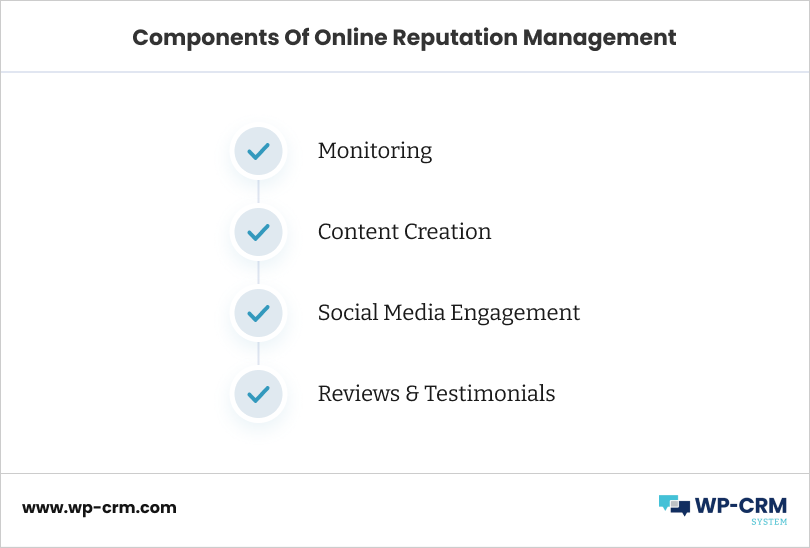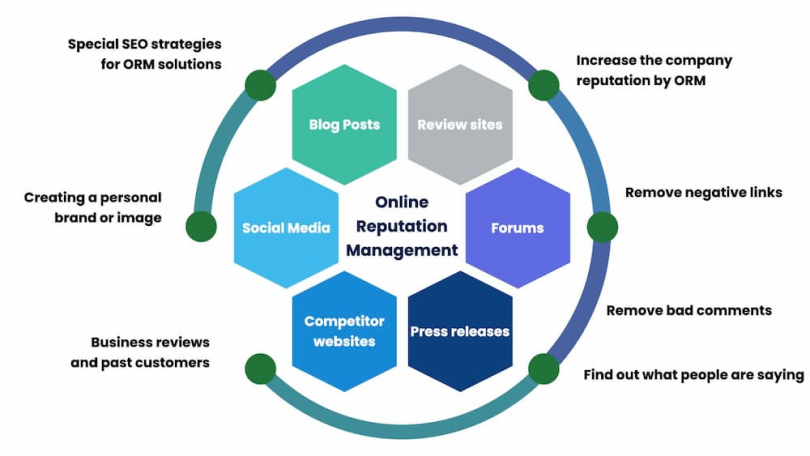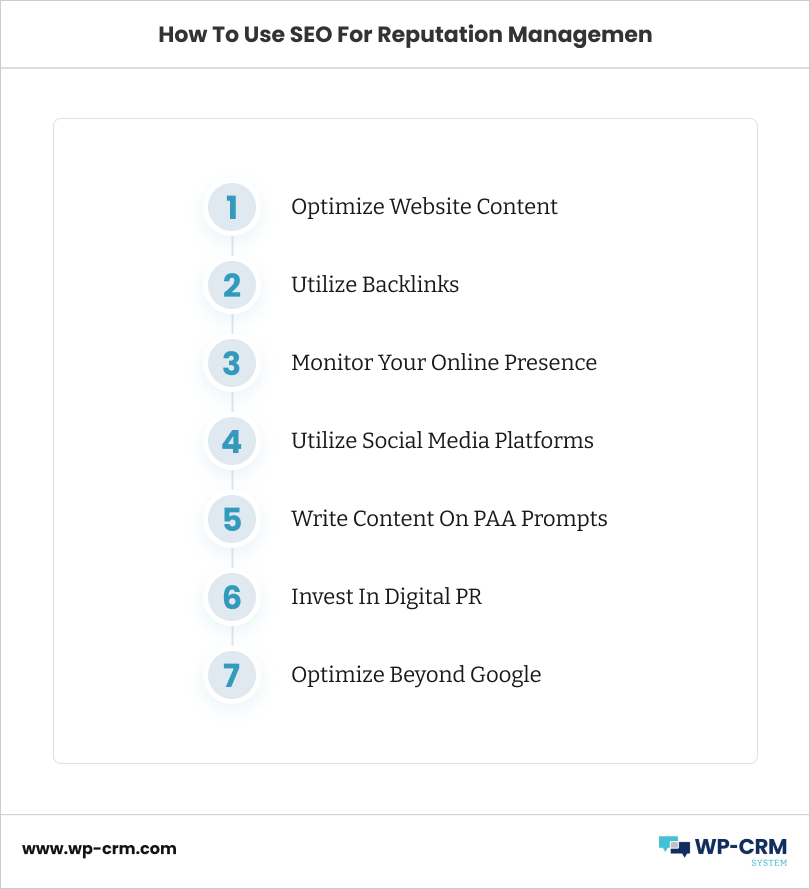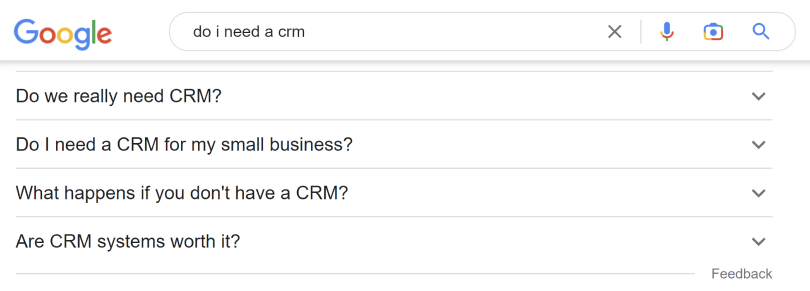SEO Reputation Management: A Beginner’s Guide
SEO reputation management is all about monitoring how your company is perceived online and making adjustments where necessary to boost positive results on the first SERP (search engine results page).
Although reputation may seem to be a subjective matter that is out of our direct control (after all, people think what they want), research shows that it represents 63% of a company’s value. If this hasn’t convinced you that reputation management is a thing and directly correlates with your success, we’ve put together a full article to ease you into this crucial business strategy.
What Are The Components Of Online Reputation Management?
First things first, let us explain the concept of online reputation management (ORM), as it certainly does not come down to SEO alone.
Online Reputation Management is the practice of monitoring and managing an individual or business’s online presence in order to influence public perception and build trust with current and potential customers. It includes strategies such as leveraging positive reviews, improving search engine rankings for favorable content, responding quickly to negative press and more.
The components of ORM include:

- Monitoring. This involves tracking mentions of your brand across different channels. Staying on top of what people are saying about you is key to addressing any negative feedback quickly and efficiently.
- Content Creation. Creating high-quality content across multiple platforms can help boost visibility and create a positive impression of your brand. This could be blog posts, videos, podcasts or even case studies depending on the industry you work in.
- Social Media Engagement. Active engagement with customers through social media can help build credibility in addition to providing customer service support whenever necessary. Responding quickly to customer complaints will show that you value their opinion which will go a long way towards creating loyal customers for life!
- Reviews & Testimonials. Gathering reviews from existing customers can help generate leads as well as give potential buyers an insight into how you operate as a company. Positive customer testimonials are incredibly effective when it comes to building trust with new buyers so be sure to collect those whenever possible!
All these components combined form an effective strategy for managing reputation online which can have a huge impact on a business’s success if implemented correctly.
What is SEO Reputation Management?

SEO reputation management encompasses all activities related to improving the visibility of an organization’s online presence on the first SERP and ensuring it appears in a positive light when users search for specific terms or phrases related to that company and/or its products or services. This process can include creating content, optimizing existing articles, monitoring all online conversations and reviews about the company, responding to customer feedback, and more.
Why Is SEO Reputation Management Important?
SEO is an integral part of online reputation management. With the best practices put into action, businesses can ensure that their online presence is optimized to generate more visibility and attract more customers. Here are some reasons why SEO reputation management is so important:
Increased Visibility
Having a good rank on search engines like Google means that you will be more visible to potential customers who may be searching for products or services related to your business. This makes it much easier to generate leads and increase the conversion rate.
Improved Brand Image
Good SEO practices can also help improve your brand image as well as boost consumer confidence in it. When potential customers search for your brand, they’re most likely going to see favorable reviews, articles, and other content which makes them much more likely to purchase from you.
Greater Insights
Analyzing SEO data can provide valuable insights into user behavior which can help inform future marketing decisions. Utilizing this data can enable businesses to identify trends and patterns which will help them understand their target audience better resulting in better conversions and ROI in the long run.
Some negative results you may experience if your SEO reputation management is poor are lower rankings on search engines, decreased website traffic, marketing spend waste, loss of visibility, profitability and overall company value.
How To Use SEO For Reputation Management
By utilizing the right SEO strategies, businesses can ensure that their online presence is optimized to generate more visibility and attract more customers. Here is a guide on how to use SEO for reputation management:

Optimize Website Content
The content on your website needs to be optimized for search engines like Google to ensure that it appears high up in search engine rankings. This includes ensuring all content has quality keywords, is well written and free from any spelling or grammar mistakes. It’s also important that the content you provide adds value and informs readers as this will help build trust with potential customers.
Keywords are the bread and butter of your content so it’s important to be knowledgeable of which of them “work”. The best tool to assess your keywords and their performance is Google Search Console. Simply go to the Performance report and click on Search Results to monitor individual pages from your website.
Utilize Backlinks
Backlinks are hyperlinks which point back to your website from another source – such as another article or blog post. Having high-quality and relevant backlinks pointing to your website can help boost your ranking on search engines.
To enhance the reputation of your brand by indicating that your content is being shared by other authoritative and trustworthy sources, you need to focus on white hat link building practices. These focus on developing relationships with content partners, creating authentic content, and utilizing social media platforms.
By following these guidelines, businesses can improve their website visibility without compromising the integrity of their content by working with link brokers and paying for links. White hat link building is a slow but steady process but it ultimately results in higher quality backlinks which will help boost SEO performance in the long run.
Monitor Your Online Presence
Businesses must regularly monitor their online presence to identify any unfavorable reviews or articles about them appearing online. If there are negative reviews or press coverage, then these must be addressed quickly before they have a chance to damage the business’ reputation long-term. After all, online reviews take up a lot of real estate on the first SERP so you must manage them properly.
Utilize Social Media Platforms
Social media platforms like Facebook, Twitter, LinkedIn etc are great tools for increasing visibility and building relationships with existing and potential customers alike. These platforms enable businesses to share information about products/services and stay connected while allowing customers to ask questions directly making it easier for customer service teams to respond quickly too.
Write Content Around People Also Asked (PAA) Search Prompts
It may seem counterintuitive to write content on negative queries but believe it or not, they often pop up in the People Also Ask feature for a reason – people ask about them and seek informative answers.

Writing content around PAA search prompts can be a great way to improve your SEO results. After all, they appear quite at the top of the first SERP, right after featured snippets. By writing content based around these queries you can make sure that your website is appearing more prominently as it is seen as relevant to the user’s specific query.
Another benefit of writing content around PAA prompts is that you are targeting an audience who already has an interest in the topic, making it easier to engage readers with your content. ALSO creating content based on PAA questions ensures that all topics covered are timely and relevant – something Google always looks for when deciding which websites should appear higher up in its search rankings.
Overall, by utilizing PAA search prompts when coming up with ideas for content, businesses have a better chance of gaining visibility and engaging their target audience – improving both traffic and conversions in turn!
Invest In Digital PR
Digital PR is the practice of using digital platforms and channels to build relationships with target audiences, gain exposure for a company or brand, and manage its online reputation.
It involves creating campaigns that promote newsworthy content – such as press releases, blog posts, videos and podcasts – across social media networks and other relevant websites. The goal of digital PR is to reach the right audience at the right time to increase engagement and drive traffic back to the company’s website.
If you’re looking to conceal an unfavorable news report based on true events, there won’t be much compassion for that. Instead of trying to bury it, use your actions and efforts as a way to garner positive press around your brand.
For example, take part in philanthropy projects or champion local teams, help protect the environment and give back to the community! Even if all this just leads up to getting an unlinked brand mention – digital PR is still crucial for reputation management and should not be taken lightly.
Optimize Beyond Google
Although Google is the search engine champion, there are other players on the ground, and a significant amount of people use them! So, make sure to optimize for Bing, Yahoo, Ask and Baidu. Each of these have their own unique algorithms and ranking systems so it is important to make sure you’re targeting them all with your SEO efforts.
For example, look into submitting a sitemap to each engine or utilize structured data for them, so that they can better read and understand the content on your website. You could also make sure each page has a meta description tailored to each engine’s requirements, as well as optimizing images with alt text – all of which will help you rank higher in their search results!
Wrapping Up
In conclusion, SEO reputation management is an important aspect of maintaining a good online presence. By optimizing website content, utilizing backlinks, monitoring your online presence, and utilizing social media platforms properly, you can effectively maintain and even improve your online brand image.
Beyond that, you should also consistently write content on PAA prompts and invest in digital PR to keep up with ever-changing trends. Ultimately, these are all valuable tools that help businesses create an authentic message and maintain their online presence in a meaningful way.
If all this seems daunting at first, don’t worry – there are experts out there who can guide you through the process of optimizing your SEO for the best possible outcome.
